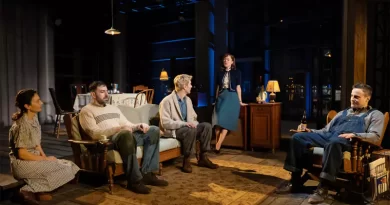“Ghosts” at Sam Wanamaker Playhouse
Jane Edwardes on the South Bank
24 November 2023
It is well known that the first performances of Ibsen’s play Ghosts were greeted with horror when it opened in London in 1891. ‘An open drain,’ said the Daily Telegraph. ‘Foul and filthy,’ spluttered Era. ‘Unutterably offensive,’ screeched the Standard. The allusions to free love, prostitution, hereditary venereal disease, incest, and euthanasia were simply too much to bear.

Sarah Slimani and Greg Hicks.
Photo credit: Marc Brenner.
But those same critics would surely have to be carried out on stretchers if they were to see Joe Hill-Gibbins’s bold new version (which he also directs), which is so much more explicit than the original. There are references to male couples happily bringing up children together. Syphilis is mentioned by name and not just by suggestion. A servant, Regine, is seen pouring champagne over her mistress. And Father Manders rolls around on the floor with Helene Alving before dragging himself reluctantly away. Sometimes Hill-Gibbins goes too far, but there’s no doubting the intensity of the evening.
Ghosts is a tricky play to stage, always in danger of slipping into melodrama. In 2013, Richard Eyre’s blistering production with Lesley Manville was a huge success. Like its predecessor, this new version races along, dispensing with an interval. Nevertheless, the beginning is leisurely as Regine lights the Sam Wanamaker Playhouse’s famous candelabra. It feels like the perfect venue for a play in which Osvald, Helene’s artist son, complains about being trapped in the gloom, in contrast with the southern European sunlight he has left behind. An oppressive atmosphere is established without the need for any heavy 19th-century furniture.
Hattie Morahan is an outstanding Mrs Alving. Unlike Nora in Ibsen’s A Doll’s House, who walks out on her husband and children, Helene, after a brief, thwarted rebellion, has been wedded to duty. She stayed with her drunken, philandering, violent husband, moving him away out of sight of the rest of the community. She sent her son off to boarding school, at considerable cost to herself, in order that he should not be aware of his father’s failings. And after the death of Captain Alving, she paid for the building of an orphanage in her husband’s name so that his reputation would never be sullied.
At the start of the play, Morahan’s Helene is full of hope and in a state of nervous excitement. The orphanage is about to be opened, drawing a line under her marriage, and her beloved son has returned home, giving her, she hopes, time to spend with him, as well as the opportunity to learn about the new ideas that are taking hold of Paris.
The representative of the prevailing culture is the man she once loved, Father Manders. Paul Hilton as Manders is so obviously only interested in appearances that his blatant hypocrisy becomes extremely funny, especially when Greg Hicks’s wheedling Engstrand is effortlessly winding him round his little finger. I have yet to see a production in which it is possible to understand what Helene sees in this pastor. As she listens to him laying down the law, Morahan reveals the timidity that has kept her at home rather than running away. She is willing to hear him out when he criticizes the book she is reading, and even agrees that the orphanage should not be insured for the ludicrous reason that people might imagine that they did not have enough faith to put their trust in God.
Gradually the secrets and lies of the past are revealed and come back to haunt them all. Aptly, the back of the stage is covered by a giant mirror, which offers the possibility of a multiplicity of realities, and in which Helene and Manders witness history repeating itself as Stuart Thompson’s Osvald is seen kissing Regine (Sarah Slimani). Designer Rosanna Vize has opted to cover the floor in a russet red fur rug on which Osvald often lies, ignored by the others, as if sinking into his diseased body. He looks like an overgrown child, incongruously dressed in shorts and a cardigan, in contrast with the formal, timeless dress of the others. Maybe it is to do with the speed of the production, but Thompson struggles in the role, barely able to reveal that he is terminally ill before he collapses. It doesn’t help that he conceals his rage and fear beneath a slightly feminine, devil-may-care jollity.
It’s not just his illness that hardly has time to establish itself, it is also the orphanage fire that is far too quickly forgotten. It would be truer to Ibsen’s own rhythms, and make for a more powerful evening, if there was a pause, if not an interval, to acknowledge the end of Act 2 and the beginning of Act 3. Hattie Morahan, however, is devastating as she cradles the son she hardly knows in her arms, while confronted with the most terrible of choices.









